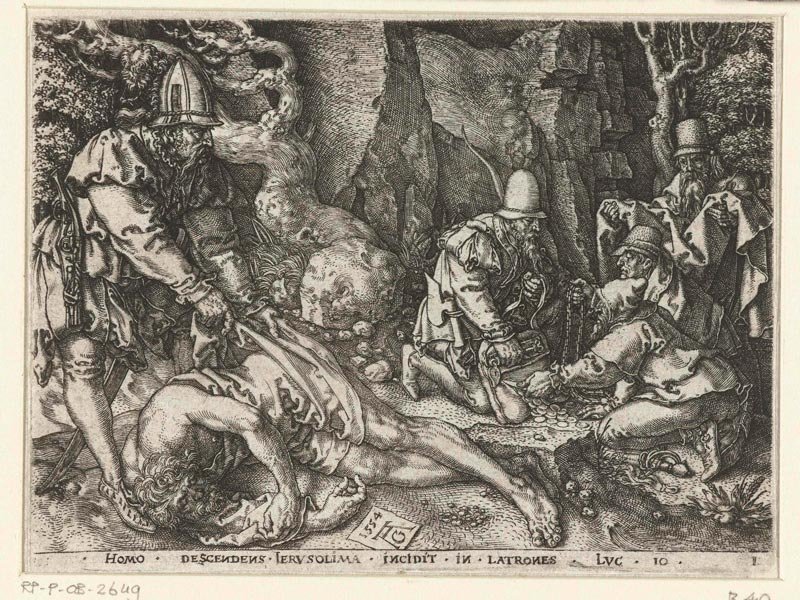“I loot the body”: the lazy GM’s guide to generating treasure on the fly
It’s a roleplay game, of course everyone in the party is a rapacious thief. And yet somehow you’ve forgotten to prepare for this. Here’s my approach to giving players something to satisfy their kleptomaniac tendencies.
I like this method because it brings players in as co-creators of your world. It’s a mini-game that’s quick and easy to explain, while letting players exercise imagination and strategy. It works just as well online or in person.
In one word, it’s Scattergories.
It’s especially thematic if your party is looting under pressure: a fire is burning, the water is rising, the guards are breaking down the door…
Man is robbed by the robbers. Heinrich Aldegrever. Rijksmuseum (CC0 1.0)
Crowdsourcing creativity
This would be a slow and boring way of achieving your goals, and lead to a lot of umming and erring and awkward pauses:
GM: Look, I don’t know what an aristocratic horse enthusiast might have in her study. Anyone got any ideas?
And here’s what it could look like:
GM: You can hear a key rattling in the lock. You have only moments before you’re discovered rifling through the Countess’ drawers. You have 30 seconds to write down everything you find, starting… now!
(The adventurers scribble furiously…)
GM: …and stop. What’ve you got?
Mechanics
To be honest, that’s probably enough for you to be getting on with, but let’s break it down a bit.
1. Set the scene
“It worked really well - it was fun to do, and felt like an empowering and creative way to reward us for a successful heist!”
Who are you stealing from? What’s their vibe? Where are you? Are there likely to be weapons here? Or jewels, books, equipment, clothes…?
Making this approach work is a lot to do with setting and managing player expectations. If you’re in a library, you’re unlikely to find a crossbow. If you’re in a peasant hut, you’re unlikely to find a dragon’s hoard.
2. Play with the parameters
You can adjust the difficulty of searching with a few simple parameters:
Time: How long do players have to search? Seconds? Minutes? Adjust your stopwatch accordingly.
Generosity: If you’re feeling benevolent, then sure, everyone finds everything they write down. You can also…
be stingier: at least two (or three, or more) players need to have written down the same thing.
reward creativity: players only receive items if no-one else has written them down.
Negative matches: Tell players what they won’t find here: No silver candlesticks in the werewolf’s dining room. No princesses in this castle. No needles in that haystack.
Creative constraints: Spark your players’ imaginations with constraints to help them focus their ideas. These could be, for example:
Physical (“…which fits inside a 2-foot trunk”)
Narrative (“…but anything flammable has been destroyed”)
Full Scattergories (“…and everything you find begins with the letter Q”)
Peril: What happens if players are caught looting? Add a push-your-luck element by keeping your timer secret. Players all have to stop voluntarily before time runs out.
Be up front with your parameters. Try not to move the goalposts after your players have put creative effort into thinking of something fun. It’s no fun to be told no. But saying that…
3. Maintain control
This is a very safe way of generating ‘flavoured’ loot, rather than just cold hard cash. If this is what you’re doing you can let your players’ imaginations run wild. Just be clear that you’ll decide on the value of anything they find when they come to sell it. It’s only silver plate. Those pearls were only paste.
There’s a danger in using this approach let players find items with mechanical effects. If you do, you should maintain a right of veto, otherwise it’s functionally a cheat code. Your players can collaborate to ‘find’ Vorpal Swords in every hovel.
4. Have fun
Give your players a bit of direction, tone and some creative limitations and let them enrich your world (and themselves).
What else can you find?
This isn’t just limited to treasure - what else could you crowdsource in a hurry? Denizens of a dwarven dungeon? Guest ales at the tiefling tavern? Give us your ideas in the comments. You have thirty seconds…


